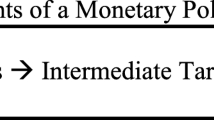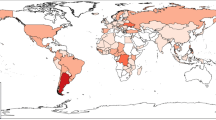Abstract
The purpose of the paper is to analyze the dynamics of EMU (The Economic and Monetary Union, i.e., the group of European countries who use the common currency euro) and to analyze the fallout from the recent financial and economic dynamics. Both the impact on the eurozone as a whole and on individual member countries will be evaluated. The first 11 years of Eurozone experience will be discussed and evaluated in the second section. The third section will then be devoted to analyzing the fallout from the recent financial and economic dynamics. Both the impact on the eurozone as a whole and on individual member countries will be evaluated. The last section concludes and provides some ideas for future development of eurozone.
Similar content being viewed by others
Notes
A typical example would be at the end of the 1970s and the start of the 1980s, during the period following the first and second oil crises of 1973 and 1979. European Community members reacted to economic problems by suspending the process of deepening economic integration. The Single European Act, which established the European Community by creating a common market with free movement of goods, services, capital, and persons, was not adopted until 1986, after economic growth had been renewed in the majority of member countries. The period from the end of the creation of the customs union in 1968 until 1986 (almost 18 years) is often referred to in the literature of the history of the European integration process as the period of “eurosclerosis” (for more, see, e.g., König et al. 2007).
The Lisbon Treaty, which replaced Treaty of Nice, deals with the exit of a member State from the EU in Article 49a: “(1) Any Member State may decide to withdraw from the Union in accordance with its own constitutional requirements; (2) A member State which decides to withdraw shall notify the European Council of its intention. In the light of the guidelines provided by the European Council, the Union shall negotiate and conclude an agreement with that State, setting out the arrangements for its withdrawal, taking account of the framework for its future relationship with the Union. That agreement shall be negotiated in accordance with Article 188n Par. 3 of the Treaty on the Functioning of the European Union. It shall be concluded on behalf of the Union by the Council, acting by a qualified majority, after obtaining the consent of the European Parliament; (3) The Treaties shall cease to apply to the State in question from the date of entry into force of the withdrawal agreement or, failing that, two years after the notification referred to in paragraph 2, unless the European Council, in agreement with the Member State concerned, unanimously decides to extend this period.”
The only country in which these impacts would be minimal upon exit from the eurozone is Germany. It may be argued that it is very likely that the credibility of the German economy would even be enhanced upon exit from the eurozone.
References
Athanassiou, P. (2009). “Withdrawal and Expulsion From EU and EMU. Some Reflections”. ECB Legal and Working Paper Series, No.10, December 2009.
EC (2008): EMU@10: Successes and Challenges after 10 years of Economic and Monetary Union. EUROPEAN ECONOMY. 2. June 2008. Brussels. 342 pp. (online). http://ec.europa.eu/economy_finance/publications/publication12682_en.pdf.
Eichengreen, B. (2007). “The Breakup of the Euro Area”, draft, University of California Berkeley, May 2007.
Euractiv (2007). Sarkozy under fire for renewed ECB criticism. 17 September 2007. (online) http://www.euractiv.com/en/euro/sarkozy-fire-renewed-ecb-criticism/article-166769.
Guardian (2005). The Euro has Screwed Everybody – Berlusconi. Guardian. 27 July 2005. (online). http://www.guardian.co.uk/world/2005/jul/29/euro.italy.
Koopman, G. J., Székely, I. P. (2009). The Financial Crisis and Potential Growth: Policy Challanges for Europe. Directorate-General for Economic and Financial Affairs. Issue 3 | June 2009. ECFIN Economic Brief. (online) http://ec.europa.eu/economy_finance/publications/publication15519_en.pdf.
König, P., Lacina, L., & Přenosil, J. (2007). Učebnice evropské integrace. Second updated and expanded edition. Brno: Barrister & Principal. 402 pp. ISBN: 978-80-7364-044-6.
Pisani-Ferry, J. (2009). The good and the bad flexibility. Bruegel Think Tank. June 2009. (online). http://www.bruegel.org/uploads/tx_btbbreugel/JPF_Le_Monde_Flexibility_Pisani_EN.pdf.
Rusek, A. (2007). Přežije eurozóna (a Evropská unie) rok 2010? (úvaha o “zakázaném” tématu). In L. Lacina & A. Rusek (Eds.), Evropská unie: příležitosti, výzvy, rizika (pp. 57–78). Plzeň: Aleš Čeněk Publishing. ISBN: 978-80-7380-077-2.
Waigel, T. (2008). Introductory Statement for the Panel Discussion on the Occasion of The Forum: 10 Years of The European Economic and Monetary Union. Brusseles, Belgium, May 2008.
Acknowledgements
We benefited from comments by Hubert Gabrisch, Zuzana Brixiova and Victoria Vasáry, discussants of 69th International Atlantic Economic Conference, Prague, /Czech Republic/, 24–27 March, 2010 and Jarko Fidrmuc, Iika Korhonen and Evžen Kočenda, discussants of International conference Thoughts about Financial crisis: Institutions and Policies, held in Brno, /Czech Republic/.November 26–27, 2009.
The results introduced in the paper are the outcome of the research grant no. MSM 6215648904. The holder of the research grant is Mendel University of Agriculture and Forestry Brno, Faculty of Business and Economics.
The paper is one of the results of the Jean Monnet Chair grant no. 2009-2736/001-001 “Dynamics of European Economic and Monetary Integration”.
Author information
Authors and Affiliations
Corresponding author
Rights and permissions
About this article
Cite this article
Lacina, L., Rusek, A. Financial Crisis and its Asymmetric Macroeconomic Impact on Eurozone Member Countries. Int Adv Econ Res 18, 63–73 (2012). https://doi.org/10.1007/s11294-011-9333-0
Published:
Issue Date:
DOI: https://doi.org/10.1007/s11294-011-9333-0




